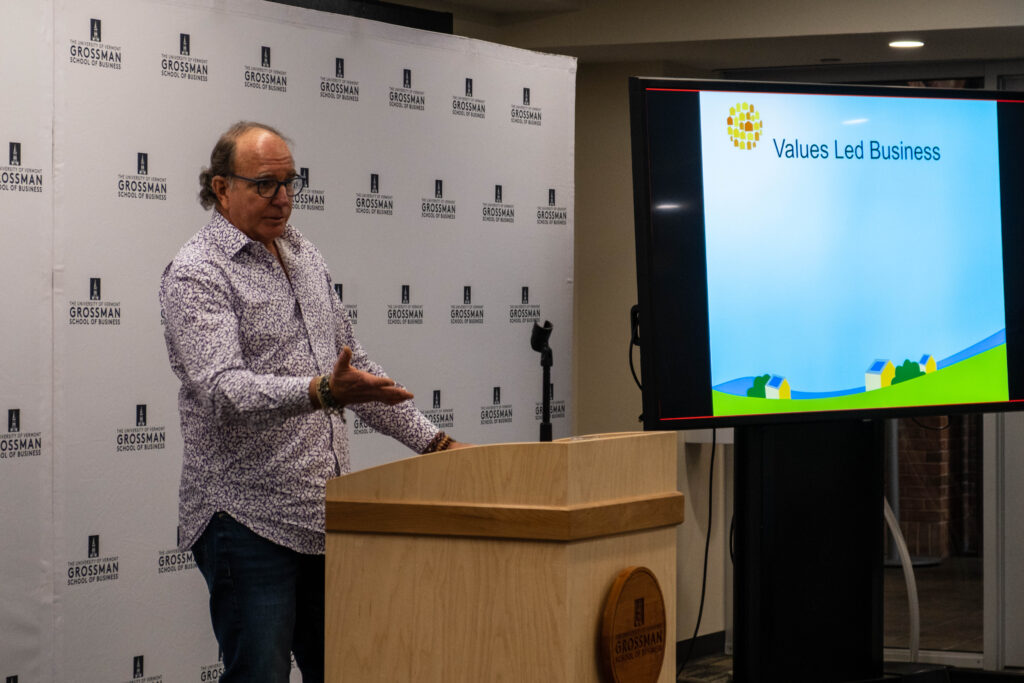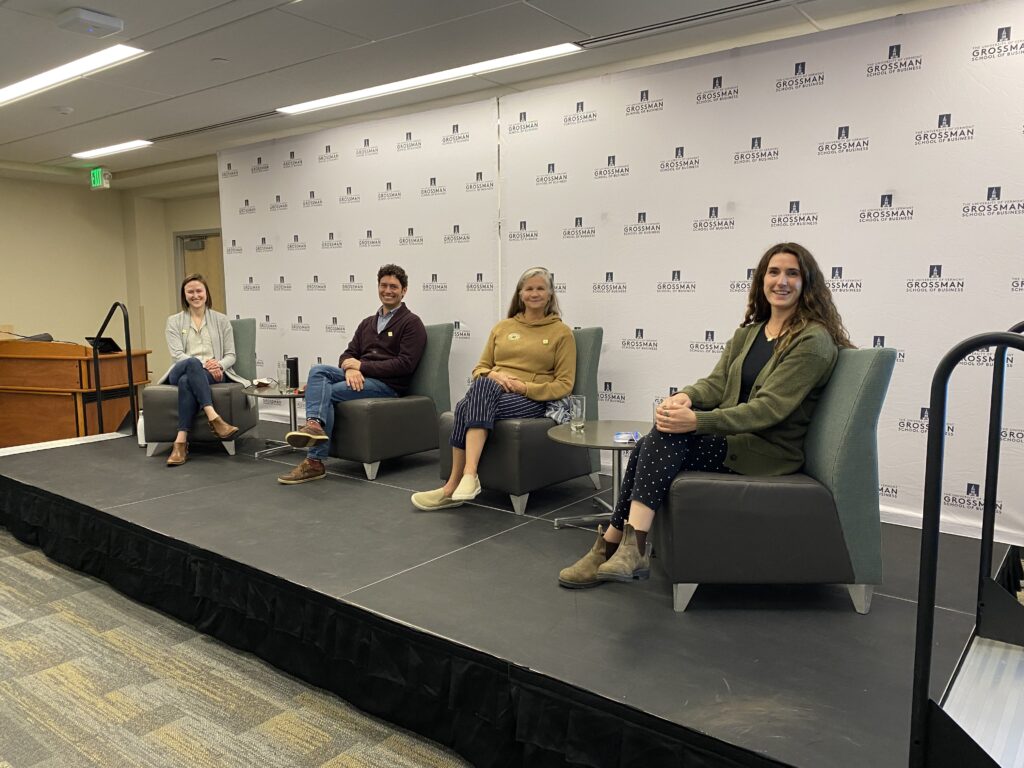Written By:
Patrick Donohue ‘22
Contributing Writer
Connect with Patrick on LinkedIn
Dan Lazarus ‘22
Community Catalyst
Connect with Dan on LinkedIn
Recently, the SI-MBA ‘22 cohort had the pleasure to spend an afternoon with Duane Peterson, Co-Founder of SunCommon, a Vermont-based installer of residential solar power systems.
Duane led us through a lively discussion about passion, community, the solar industry, and more.
“Those with the biggest buildings have the power,” said Duane at the beginning of the conversation. Throughout human history, control of the largest structures systematically and often subconsciously expresses power over others. The pyramids, then the cathedrals and now energy, industry, finance, and more. Duane opened his talk with a thought-provoking idea and a lens to analyze power. The fight for a more just world (healthier, more sustainable, more equitable) is inextricably linked to power. While low-income communities are disproportionately affected by climate change, they are continuously overlooked during the decision making process. In the context of SunCommon, Duane built a low-cost solution for residential solar energy production, and simultaneously removed barriers for people historically locked out of the solar revolution.

Duane spoke to us with a heavy dose of honesty. Adorned in a patterned button-down and his quintessential purple framed spectacles, he spoke with eloquence and full transparency. Throughout the three-hour discussion, the audience leaned forward with eagerness, firing questions at Duane. There was an air of excitement in the room, verging on intensity.
Duane is laser focused on people and believes wholeheartedly that, “how we treat each other matters a lot.” His candid responses to our cohort’s questions, “off-the-cuff” style of presentation, and acknowledgment of his own privileges speak to the people-centric values that underpin everything he does at SunCommon.
“How we treat each other matters a lot.”
Wrapping up his speech came a question from the back of the room. “What advice do you have for us as business students?”
“What a fitting finale,” Duane quipped. “Find the people you want to do business with, identify what matters, and hold out for that.”
In the leadup to his in-person speaker series with SI-MBA, we were fortunate to have the chance to speak with Duane one-on-one and learn more about his personal journey.
Duane has enjoyed an exploratative career, including years spent as a police officer, ambulance medic, political campaigner, environmental advocate, and “Chief of Stuff” at Ben & Jerry’s. Speaking with Duane, it was evident that his passions lie in organizing towards justice and developing clear, common-sense initiatives to tackle the systemic problems he sees in his community.
Below is a synthesized snapshot of the provocative interview:
Tell us a little about yourself and your involvement in sustainability?
I think of myself as a millennial. As millennials, we’re open to adventure, we’re seeking knowledge, we want to explore new things, we’re not going to do the same jobs for 40 years at a corporation. The people I hire, I know they aren’t going to work here forever. I hope they’ll find fulfillment with their jobs and pour themselves into it, but then I hope they go on and see what’s next for them. I think that’s beautiful.
To me, sustainability is an objectionable word. I think of it like I think of the word tolerance. It comes across like it’s the bare minimum. Well, how about a positive impact? It’s still not perfect, but rather than sustainability, I like to think of values-led business, that is, imbuing business with good and providing a beneficial outcome.
How did your work at Ben & Jerry’s and their B-Corp certification inform your work in developing SunCommon?
The simplest way to think about it is this: at Ben & Jerry’s, we sought to have every business decision reflect our values. What are you actually doing every day? How are you treating your people, communities, and environment? Who do we hire? Where do we set up our factories? That’s the power of the business. That sort of thinking gave us an appreciation for and ownership of impact. Let’s use the power of business to do good things at every level. When we started SunCommon, that was the vibe from the very beginning.
“Let’s use the power of business to do good things at every level.”
How important is the B-Corp certification to your company, and how much bearing does it have on your day-to-day operational decision-making?
We were very surprised at how rigorous the assessment was. There were a bunch of issues that we hadn’t considered. The coolest thing about it was the app. When you entered a finding, there would be a pop-up that would ask, ‘Would you like to improve your impact?’ Well sure! And the feed would put you into contact with another B-Corp that had already tackled that issue. This certification helps us get away from winging it and drives us into the rigor. And we’re really excited about that.
I was also a little surprised that the certification had meaning to others. Through the certification, we attract a lot of brilliant young people that care and are looking for fulfillment.
How does community involvement, as well as your involvement with VBSR (Vermont Business for Social Responsibility) and VPIRG (Vermont Public Interest Research Group), fit into your mission/ passion as a leader?
I think a lot of older white guys in this movement appreciate the attention. That can be an insular, looking for aggrandizement thing, like ‘this is about me,’ or it can be about establishing standing to include other people. I think I probably have a bit of both. I operate in these networks; I learn a lot from these people and am inspired by their ideas. I hope that I can also support them, what they’re doing, and provide credibility, resources, and advancement with my presence. It’s an interesting transaction and positivity that I pull from this involvement, and I’m grateful for it.
Given your rapid growth and recent merger with iSun, what measures has your management team put forward to maintain company culture and vision?
The issue is that iSun wants us to share what we know and our values-led approach to business, and as we bolt more into the platform, the question is: how do we export what’s good about SunCommon? Right now, that’s a bit unknown. We’re not a consulting firm [designed] to share things we’ve already figured out. And yet, in some ways, that’s what iSun paid for. So, how do we keep our day jobs and keep growing the business of SunCommon, while also spreading our joy and wonder? We haven’t figured that out yet, but we’re gonna need to!
How has your relationship with James (co-founder and co-president at SunCommon) evolved over the years, and how does your partnership foster long-term development of SunCommon and other community initiatives?
We met in 2008 when I was the board president at VPIRG, and he was the whip-smart director of the clean energy program. We designed the campaign to retire Vermont Yankee, the nuclear power station. So we ran this campaign and pulled it off! We’re extraordinarily different people, but we discovered that our strengths and weaknesses really line up well. So James and I cooked up a project at VPIRG to prove that the adoption of clean energy was feasible, and when that worked, we decided to start a business.
What advice can you provide for young professionals seeking to find a foothold in the field of renewables, climate change, or values-led enterprise?
My advice to young people is to just go do things! There’s so much to do in this world. Gain experience by just diving in and doing interesting things. And if this is the field that you want to get into, define what these terms mean, what are the jobs in it, what are the descriptions and qualifications that employers are looking for. Then go crush it.

If you are interested in the work Duane has been a part of, the change he advocates for, or the people that inspire him, check out the book Double Dip by Ben Cohen and Jerry Greenfield or the paper entitled Repowering Vermont by James Moore.
This interview has been lightly edited for clarity.


